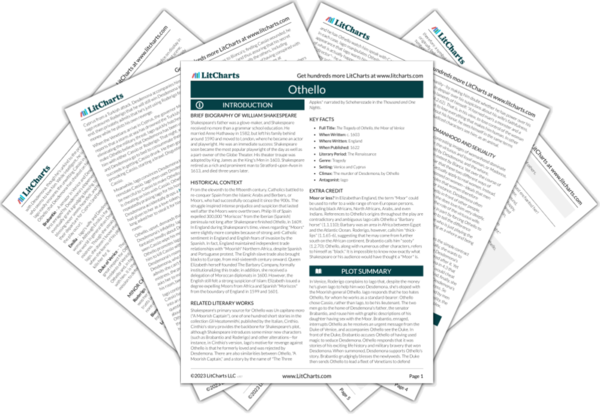Throughout the play, various male figures seek to assert and protect their manhood and their honor. Based on the Duke's regard for him in 1.3, it is clear that Othello has attained political power through his military might. The subplot in which Iago gets Cassio drunk and causes him to humiliate himself, also indicates the importance of "reputation, reputation, reputation." In fact, Cassio asserts that reputation is all that makes you human ("I have lost the immortal part of myself, and what remains is bestial" [2.3.252-3]). Iago asserts—however genuinely or disingenuously—that reputation is more valuable than anything in the world: "good name in man and woman [...] is the immediate jewel of their souls" (3.3.156).
Though military exploits are one way for men to build their honor, when not in war the primary means by which men define their honor is their ability to command the faithfulness of their women. In 1.1, Iago and Roderigo call Brabantio's honor into question because he hasn't been able to control the romantic or sexual impulses of his daughter, Desdemona. Later, Iago drives Othello to question his own manhood—indeed, his very humanity—by making him doubt whether he has power over his wife. In despair over his suspicions about his wife's faithfulness, Othello laments of himself: "A horned man's a monster and a beast" (4.2.62). That is, in his view, to lose control of the woman in his life is to lose everything that makes him human. In other words, without his honor, he sees himself in the same terms that the prejudiced characters see him: as an animal.
Manhood and Honor ThemeTracker

Manhood and Honor Quotes in Othello
Act 1, scene 3 Quotes
And little bless'd with the soft phrase of peace:
For since these arms of mine had seven years' pith,
Till now some nine moons wasted, they have used
Their dearest action in the tented field,
And little of this great world can I speak,
More than pertains to feats of broil and battle,
And therefore little shall I grace my cause
In speaking for myself. Yet, by your gracious patience,
I will a round unvarnish'd tale deliver
Of my whole course of love."
Act 2, scene 1 Quotes
Twere now to be most happy, for I fear
My soul hath her content so absolute
That not another comfort like to this
Succeeds in unknown fate."
Act 2, scene 3 Quotes
Act 3, scene 3 Quotes
Is the immediate jewel of their souls.
Who steals my purse steals trash; tis something, nothing;
Twas mine, tis his, and has been slave to thousands.
But he that filches from me my good name
Robs me of that which not enriches him
And makes me poor indeed"
Act 4, scene 1 Quotes
Act 5, scene 2 Quotes
Speak of me as I am. Nothing extenuate,
Nor set down aught in malice. Then must you speak
Of one that loved not wisely, but too well;
Of one not easily jealous, but, being wrought,
Perplexed in the extreme; of one whose hand,
Like the base Judean, threw a pearl away
Richer than all his tribe; of one whose subdued eyes
Albeit unused to the melting mood,
Drops tears as fast as the Arabian trees
Their medicinable gum. Set you down this.
And say besides that in Aleppo once,
Where a malignant and a turbaned Turk
Beat a Venetian and traduced the state,
I took by the throat the circumcised dog
And smote him—thus."











